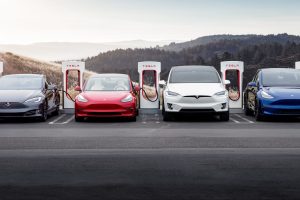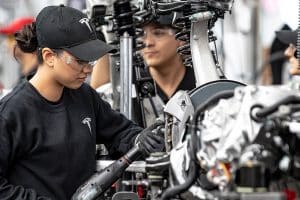- 💬 Former Presidential Candidate Vivek Ramaswamy sees the rescinded Tesla pay package as “a threat to the future of capitalism.”
- ⚖️ Delaware Chancery Court Judge McCormick ruled against Elon Musk’s pay package, deeming it not beneficial or fair to Tesla shareholders.
- 📉 Despite over 70% shareholder approval, the court decision raises questions about the business judgment rule and courts interfering with board decisions.
- 🎥 Ramaswamy expressed concerns about the court undermining business judgments that aim to maximize shareholder value in a three-minute video on X.
- 🔄 Musk responded to Ramaswamy’s video, agreeing with the concerns raised.
- ⚖️ The Delaware Supreme Court has the potential to appeal Judge McCormick’s decision.
In the ever-evolving saga of Tesla and Elon Musk, a recent development has sent shockwaves through the business world. Former 2024 Presidential Candidate Vivek Ramaswamy has weighed in on the rescinded pay package of the tech mogul, labeling it “a threat to the future of capitalism.” Let’s delve into the intricacies of this situation and explore the potential implications for both Tesla and the broader capitalist landscape.
Understanding the Ruling
The heart of the matter lies in the decision by Delaware Chancery Court Judge Kathaleen McCormick. She ruled against Elon Musk’s colossal pay package, asserting that it wasn’t beneficial or fair to Tesla shareholders. Despite more than 70% of shareholders approving Musk’s compensation, the judge’s ruling raises critical questions about the sanctity of shareholder decisions and the oversight role of the courts.
Unpacking the Business Judgment Rule
At the core of the controversy is the business judgment rule, a legal principle that generally prevents courts from interfering with decisions made by a corporation’s board. Ramaswamy, in a three-minute video, expressed his concerns about the court’s interference with the board’s prerogative to maximize shareholder value. This decision challenges the fundamental principles of corporate governance and risk-taking.
Ramaswamy’s Perspective
In his video commentary, Ramaswamy argued against the court’s intervention in what he considers calculated business risks taken on behalf of shareholders. He deems the court’s decision as a potentially dangerous precedent, emphasizing the importance of a business risk-taking mindset in corporate decision-making.
Musk’s Response
Elon Musk, never one to stay silent on matters concerning his companies, responded to Ramaswamy’s video with a simple yet impactful “Exactly.” Musk’s agreement with the concerns raised by Ramaswamy further fuels the debate on the delicate balance between legal oversight and the autonomy of corporate decision-makers.
The Road Ahead
As the dust settles, the spotlight now shifts to the Delaware Supreme Court, which holds the power to appeal Judge McCormick’s decision. The outcome of this potential appeal could set a significant precedent for how courts engage with corporate decisions, especially those involving high-profile figures like Elon Musk.





